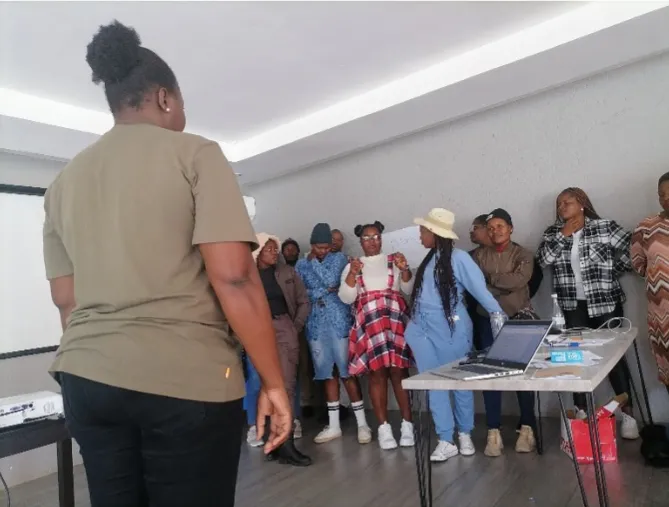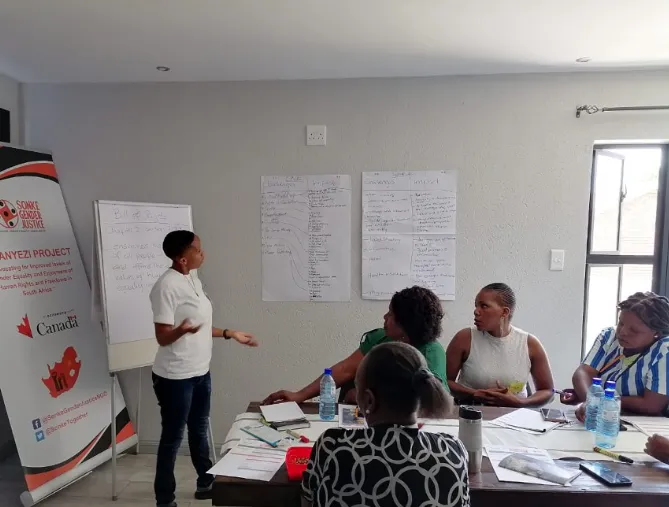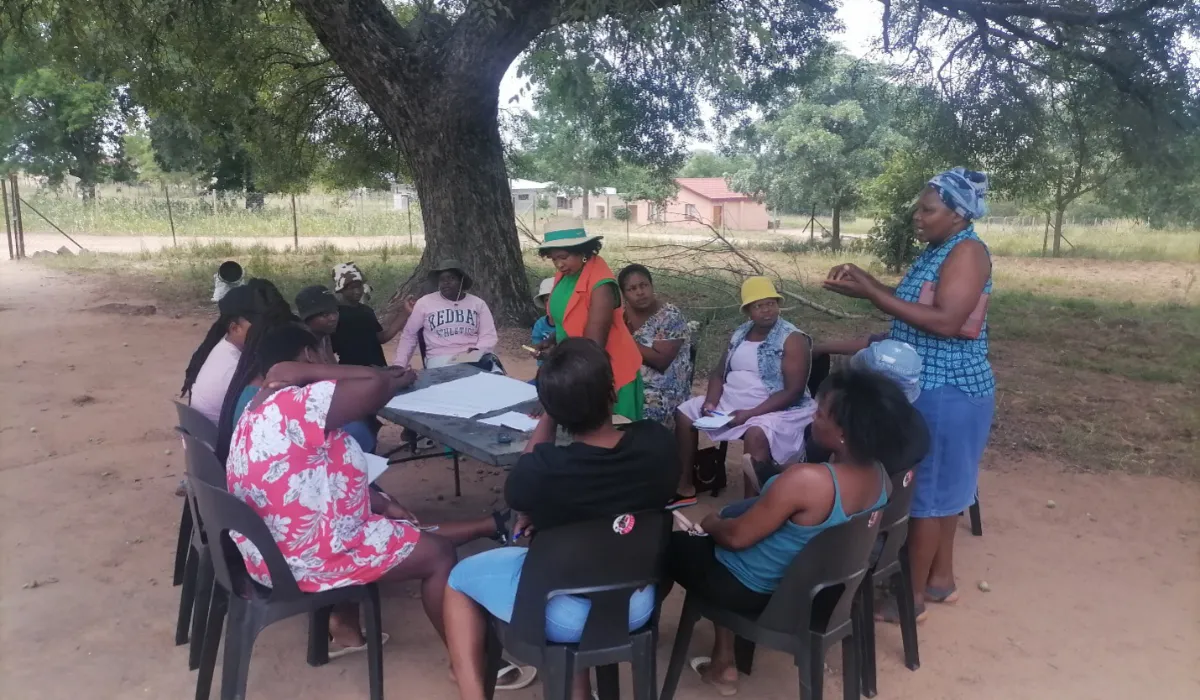Sonke in partnership with Global Affairs Canada is currently implementing the Inkanyezi project in the Amathole East District of the Eastern Cape, as well as the Ehlanzeni District of Mpumalanga Provinces. The program seeks to strengthen the ability of women leaders from political, traditional, and religious structures to influence local decision-making processes, especially with respect to laws, policies, and customs relevant to women’s rights, leadership, and gender inequality.
Since its inception, Sonke has hosted workshops and community dialogues for various women and young leaders to expand their knowledge of leadership and governance, as well as provide the tools to actively participate in transforming their communities. We give a summary of the community engagements this project has held since December 2023.
Inkanyezi hosted a feminism training with women leaders in Mpumalanga, to enhance women leaders’ understanding of feminist transformative leadership and politics to enhance their confidence as women leaders in the sector to assume leadership and challenge discriminatory practices.
‘’Women have always led. They lead their families, communities, churches, and traditional settings. This shows women innately have leadership skills which just need to be enhanced to can better apply themselves in governance spaces within their communities, so when bringing women together in such spaces and giving them the tools to partake in leadership positions, you are bound to see change in their communities. ‘’said Rhandzekile Mathebula, Sonke’s Senior Trainer.
One of the participants, Temoso Sekgobela, had this to say ‘’I attended the training with the intention to learn about leadership and implement the knowledge in my role as a leader. I have learned about the tree analysis approach and it has become my go to tool for managing problems in my immediate environment since it makes life more precise and allows one to concentrate more on addressing issues at their core causes. I also learned about the importance of participating in municipal IDP processes for my community needs and challenges to be addressed. I have learned about gender budgeting, and its importance of including women’s needs in the government budget’’.
The project recruited and trained Community Action Team members. CAT members are individuals or members of community-based organisations who volunteer for Sonke Gender Justice and perform designated social justice activities for their communities. CATs promote gender equality, community human rights education, gender-based violence prevention and the reduction of the spread of HIV. They also organise local government and traditional leadership partnerships and advocacy, to achieve gender justice in alignment to Sonke’s values, mission, and internal policies.
The training was to familiarise the recruits with Sonke’s code of conduct and equip them with knowledge about community mobilisation, basic containment, existing referral mechanisms, and action planning procedures.
Innocentia Chauke is one of the recruits ‘’I joined the Inkanyezi project as a CAT member, I’ve since attended many capacity building training, one of which was on feminism, in which I learned about power dynamics and patriarchy. We know that men often want to suppress women, but my takeaway is that women can take that power back and lead’’.
The team has also hosted a joint community dialogue with Chapter 9 institutions in the community of Hluvukani, Bushbuckridge in March 2024. This was to engage the community on gender equality, rights and gender-based violence. The dialogue was due to the community outcry to address GBVF issues, following a femicide case that took place in that community.
At the gathering, the Commission for Gender Equality educated the community about the constitution and their rights. Other stakeholders that presented, shared information about the programmes they offer and how they can be used as pathways to justice. Community members also had the opportunity to identify gaps on addressing gender equality, service provision and how everyone can play a role in addressing gender equality.
‘’ This dialogue reminded the community on how everyone needs to be accountable to addressing gender inequality and violation of human rights. It was also important for us to touch on the National Strategic Plan on Gender Based Violence and Femicide and how each pillar plays a role in issues addressed by the community’’ said Nomalanga Ngwenya, Sonke’s Project Manager.
Another of the events was the family dialogue, which provided a platform for conversations on the role families play in supporting women leaders in communities and to share ideas of how to strengthen family units.
‘’I learned the importance of treating our children equally regardless of their gender. Now I believe that household chores are not meant for a certain gender, everyone can do it. I also learned that for gender based violence to end we should start by educating our children about it at home, schools and in churches. As women we turn to look away when another woman is suffering. What I have now learned is the importance of supporting one another and working together. I recommend that to tackle GBV, it must be taught from grade R to higher grades, government departments must join hands and all of us must help to build a better nation’’ said Elizabeth Mashele, Ward counsellor and participant.
The dialogue was supported by stakeholders from among others, the Civil Society Forum, Independent Electoral Commission, traditional indunas, representatives of ward counsellor and families of women leaders.
‘’We had groups of both women and men for this session. We think for a holistic approach to women’s leadership, gender equality and human rights, more education is needed on gender norms and gender equality in our communities especially for the male counterparts’’. Nomalanga Ngwenya, Sonke’s Project Manager concludes.
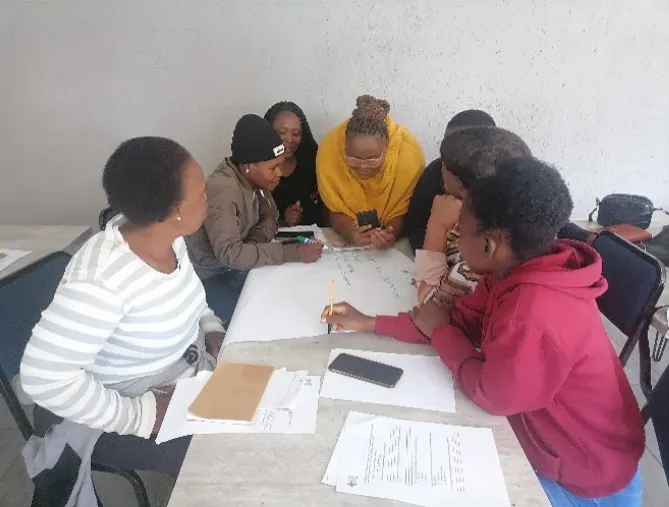
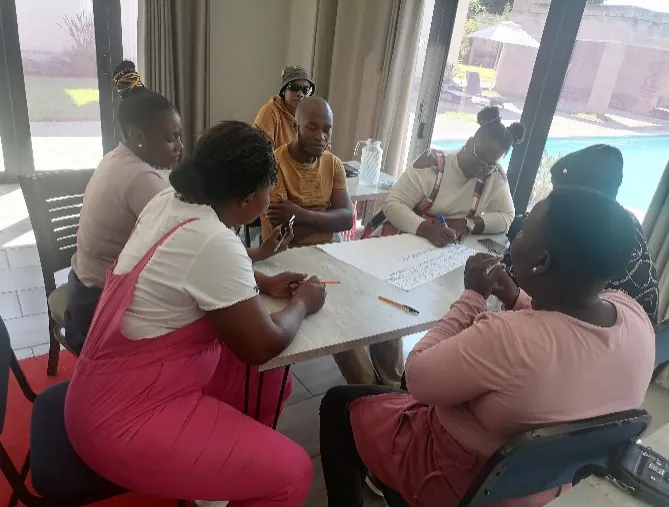
Reflections from a Woman leader of the Inkanyezi project in the Amathole East District of the Eastern Cape Province.
By Nonkosinathi Mtayisi, participant of the Inkanyezi project
‘’There was a case of a young woman who suffered severe injuries due to assault and burn wounds after her boyfriend used an electric iron to burn her. The boyfriend was arrested and later released on R500 bail while the woman was hospitalised and fighting for her life in the Intensive Care Unit. The office of the Speaker at Mnquma Municipality directed responsible Ward Councilor and Women’s Caucus leadership to speak with Sonke Gender Justice in relation to the case. Multiple engagements were held as part of case monitoring around Amathole district and that is when I met this powerhouse organisation, Sonke Gender Justice.
As I participated in these various events and engagements, I further learnt practical ways on how case monitoring is done and that it requires someone who is firm and focused as the overall monitoring involves challenging old ways of doing things and challenging patriarchal and violent tendencies that have been normalised for the longest times. The organised individuals, networks, and institutions in support of the case continued to receive awareness raising and informative sessions from the Sonke team.
I commend the team for being kind and gentle as they took us through the different scopes on GBV prevention, reporting processes and case monitoring. I was new in this kind of radical activism space and committed to join hands in the fight against violation and abuse of women in their diversities. Advocacy campaigns continued to challenge the court as the victimizer violated bail conditions on several occasions. A case of a woman beaten and burnt with a hot iron alarmed communities and was shared across social media platforms, because of this, we owed that woman extreme support to demand justice for her. On August 31, 2023, the victimizer was sentenced to 12 years imprisonment by the Butterworth magistrate court because of our effortless involvement.
I was overwhelmed at this time, because I was also assigned a responsibility to lead a gender desk which had to look at protection of human rights regardless of gender. When we saw how the case monitoring is done, it was at a time that I was not confident with myself and attempted to refer another GBV case to Sonke, again they reminded me of their ongoing support and encouraged me and my institution to own this leading role. They supported me with technical expertise, guided me and even made time to brainstorm with me and the team on how to pass through a certain stage. I am proud today to indicate that the case we followed as an institution led to another sentencing of 12 years imprisonment.
My continued determination to fight for safer communities and gender equality with the assistance of Sonke Gender Justice, I will contribute to the reduction of GBV cases. Through my connections with Sonke, I am happy and feel ready to continue investing in my fight against GBV.
Having attended multiple trainings at Sonke, I can now stand up for myself against male leaders who are the perpetrators of these violent behaviours against women and who often intimidate women leaders and continue using patriarchal tendencies that have total disregard of women leader’s existence. I am confident and always keep in mind that being a woman does not mean I am less of a human being.
Sonke gender justice must keep empowering women to bring back their dignity.’’
